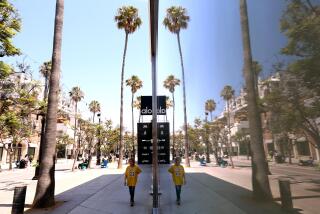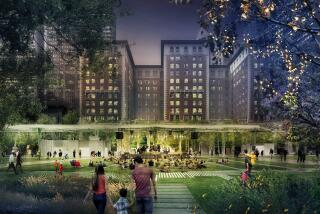Harvard Square Neighbors Fight Change : Cities: Stores selling designer clothes and gourmet coffee are replacing the coffee shops and dusty bookstores.
- Share via
CAMBRIDGE, Mass. — Harvard Square’s brick facades border streets where students mix with aging hippies. Scholars read at sidewalk tables outside coffee shops. Classical musicians play for loose change.
But Harvard Square is changing.
Businesses that once defined the square have been replaced by stores more common to suburban shopping malls. Tourists hunt for souvenirs instead of atmosphere.
“It’s a real loss,” said John Pitkin, president of the Mid-Cambridge Neighborhood Assn. “There was something unique there, and I think the developers have killed what it was that made it interesting.”
The very prestige of Harvard Square is hastening its change, observers say.
Landlords are cashing in by raising rents above what small, individualized businesses can pay.
The square’s neighbors are fighting to preserve it. They say the outcome of the battle will reverberate in college towns across the nation.
“Why do we have to live in a homogenized world?” asked Gladys Gifford, president of the Harvard Square Defense Fund. “Why does every single shopping district have to proliferate with the same stores? Why do we have to lose uniqueness in this world? If nothing else, it’s boring.”
Harvard Square was dominated once by coffee shops, by the famous small department store known as the Harvard Coop and by dusty bookstores. There was the Club 47, where Joan Baez got her folk-singing start. The Brattle Theater--a mecca for film buffs--housed both the Algiers coffee house and the Casablanca club.
“Those were hangouts as much as any place could be for the literary, intellectual types,” said Charles Sullivan, director of the Cambridge Historical Commission. “Now there are no longer any hangouts.”
Instead, the square is filling up with stores for designer clothing, gourmet cookies and Harvard coffee mugs. Two shops selling natural cosmetics and a giant record store are scheduled to open soon.
“When the baby boom generation got to college, there developed a youth culture that practically overnight replaced the genteel, Ivy League sort of character of Harvard Square with something very different,” said Sullivan. “And the rate of change has accelerated in the last few months.”
The last survivor of the family that was Harvard Square’s most influential landlord died three years ago, taking with him the idea of charging low rents to selected tenants in the interest of diversity.
“Everything was a little bit smaller scale--in some ways easier, because it was a little more personal,” said Charles Sage, a member of the Harvard Square Advisory Committee and owner of a Harvard Square market founded by his grandfather in 1898.
The number of bookstores, for which the area is famous, has actually increased from 26 to 32 since 1980. But changes are expected there too.
“It’s very difficult for independent business people to afford the price of admission to Harvard Square,” said Hillel Stavis, owner of Words Worth Books. “There is a saturation point, and I think we’ve reached or gone beyond it.”
Stavis said some bookstores will be forced to close.
“In a sense, what’s happening here is just reflecting what’s happening in the country,” he said.
Some critics blame Harvard University--one of Cambridge’s biggest landlords with $163 million worth of commercial property--for helping speed the trend toward mass-market uniformity by squeezing out local businesses.
In 1979, Harvard was criticized for evicting a bookstore to make way for a pizza parlor. It has not done anything so drastic since, but has continued to increase the rents.
“Harvard is just looking at the bottom line,” Gifford said. “They can set the rents for the rest of the square, and it’s the national chains that can pay the highest rents.”
More to Read
Sign up for Essential California
The most important California stories and recommendations in your inbox every morning.
You may occasionally receive promotional content from the Los Angeles Times.













